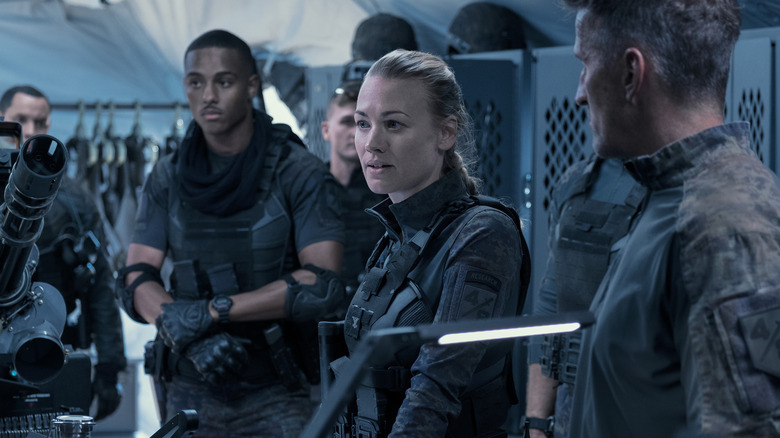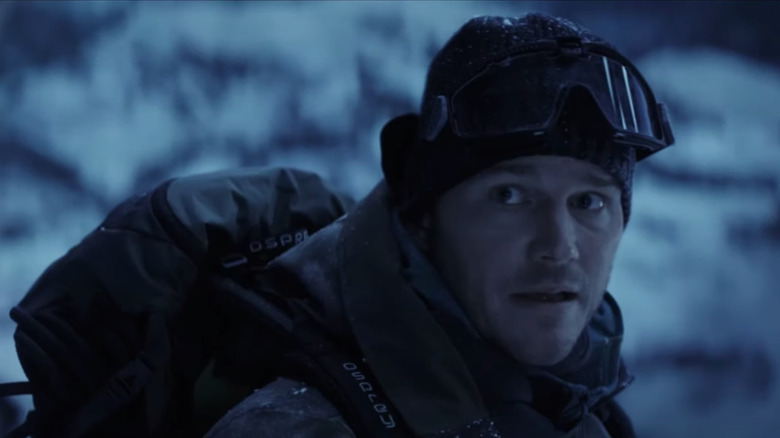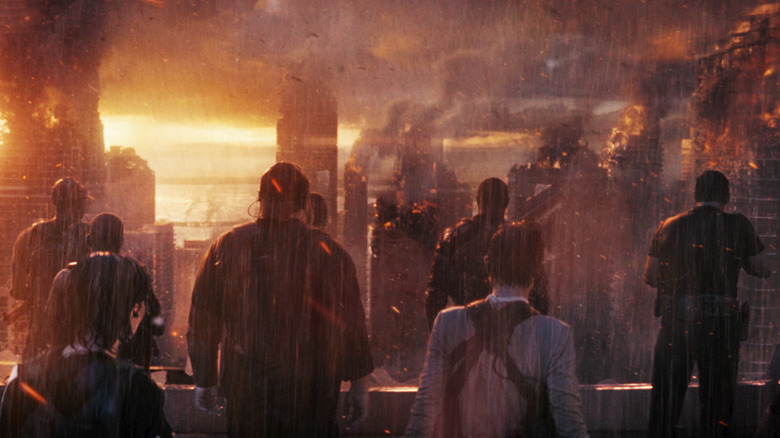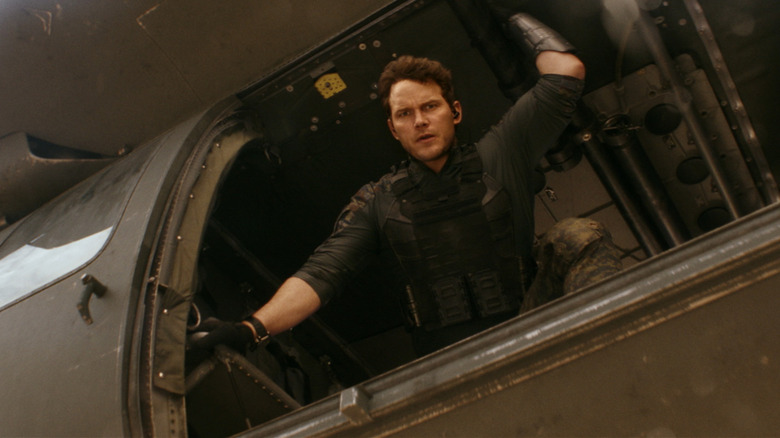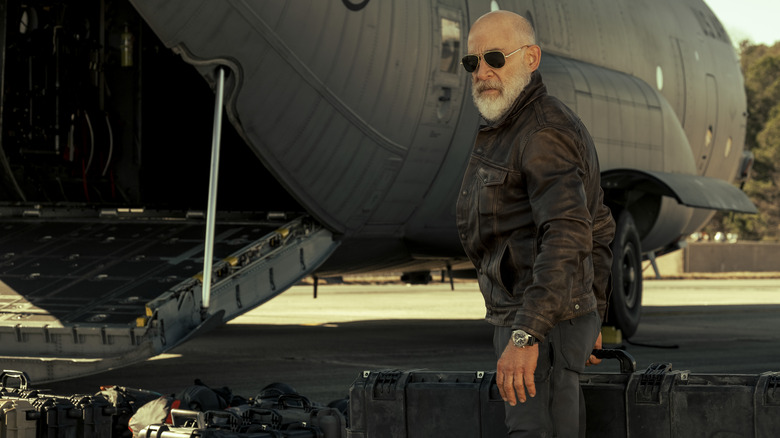The Ending Of The Tomorrow War Explained
Like a lot of alien invasion films, "The Tomorrow War" is packed with little elements of internal mythology, whether we're talking about the circumstances of the invasion itself or the terrifying creatures that begin to overrun the Earth. But unlike many of those films, this one adds an element of time travel to the mix, setting up a world in which humanity begs for help from its own past, recruiting soldiers to jump 30 years into the future in the hope that total extinction can be avoided. It's a compelling setup, and it means the film is packed with worldbuilding and major implications for the larger universe, right up to its ending.
You might think you know where "The Tomorrow War" is going from the moment its setup is revealed and its hero (Chris Pratt) is off on a time-hopping adventure, and you might be right. But even if you see the conclusion as rather straightforward, a closer look reveals many fascinating implications of the larger world within the film, and they all merit a deeper exploration. So, from the aliens themselves to the central characters, let's take a look at the ending of "The Tomorrow War." (Warning — there are spoilers below.)
Dan's future
When we meet him, Dan Forester is obsessed with a certain vision of the future for himself, a future in which he becomes the scientist he'd always hoped to be, making his family proud in the process. When that plan doesn't work out, Dan begins to spiral, and so does the world around him, as the future war draft begins, and he eventually learns that his insecurity over his path splinters his family ... before his own death in an accident in 2030. For Dan, the future he made for himself — the one that began the night he was told he didn't get his dream job — was a bleak one.
But fighting in the future war, returning safely, and defeating the White Spikes before they could spread seems to have turned Dan's outlook around, if not his whole life. The movie doesn't tell us exactly what his future holds. We have no idea if he's able to parlay his heroics into getting his dream job after all, if his new friend Charlie (Sam Richardson) helps fulfill his science dreams, or if he manages to survive past 2030 in the new future he's helped to carve out. But the good news for Dan is that he's finally found the real purpose and meaning in his life, thanks to losing his daughter in the future. For however much time he has left, Dan is focused on his family, and that seems to be enough.
Muri's future
Though he jumps into the future and then back into the present, Dan Forester's "Tomorrow War" story is actually fairly straightforward. The same cannot be said for his daughter, Muri Forester (Yvonne Strahovski), who grows up to become a respected and tireless military research scientist and ends up working with her dad in an effort to save the world. We follow Dan for the whole film, but we see Muri in fragments, and her ultimate fate in the film means her future is rather ... complicated.
We know that during her childhood, Muri was very interested in science, so it makes sense that she grew into a key researcher in the fight for humanity's future. But by the end of "The Tomorrow War," future Muri isn't just dead — the future she was a part of has been changed by her father's heroism. The last time we see her in the film, it's as a child, still full of hope and promise and unaware of her future self's struggles, including her parents' divorce and her father's early death after an accident. As with Dan, we don't know if Muri's future still holds these things. The film doesn't tell us what she grows up to be after the future war is wiped away. What we do know is that her father and grandfather, James (J.K. Simmons), have worked together to give her an undecided future, which is quite the commodity to have in a film like this one.
The future of the family
"The Tomorrow War" ends with the future everyone has accepted being wiped away, leaving plenty of unanswered questions for our heroes and for the world at large. Many of these unanswered questions are positive things, leaving open endless possibilities now that humanity doesn't actually know that they'll be wiped out in 30 years by an alien horde. But one question might linger over at least one character like a terrifying eventuality.
When he meets the future version of his daughter, Dan learns that he and his wife, Emmy (Betty Gilpin), eventually divorce, in part because of his own personal insecurities throughout the 2020s. When he arrives back in the present, recommitted to his family, Dan seems resolved to keep that from happening by being a devoted father and husband, but can he ever really know that he'll prevent it? What if he and Emmy are just destined to have a finite marriage? What if some other disappointment comes along to make him spiral again? Dan can work as hard at being a husband and father as he wants, but some things might be inevitable ... or not.
Lingering trauma at the end of The Tomorrow War
Early in "The Tomorrow War," we see Emmy Forester using her own skills and expertise to help in the war effort, serving as a trauma counselor for veterans who've returned from their seven-day tour of duty in the future. Though they survived their fight with the White Spikes, many of these people are missing limbs, and the psychological damage runs even deeper. It's a major mental health crisis amid the larger crisis of the battle for the future.
By the end of the film, the fight for the future is seemingly over, but that doesn't change the experiences of the veterans who made it back to their present. The battle is over, and for those in the future, it never even happened. But for the soldiers who survived, the scars will remain forever. In a world eager to move on from crisis, will those veterans be taken care of? Veteran care is a major issue in our real world, so what will it be like in a world where the global war effort has ceased? Hopefully, people like Emmy will keep fighting for them because their wounds didn't vanish when the White Spikes did.
What happened to the future soldiers?
Early on in "The Tomorrow War," as the human race of the present is just learning to comprehend the future threat and the time-travel system that warned them about it, Dan and his new friend, Charlie, make a discovery. All the soldiers who've been sent back to train them for future battle are quite young, so young that they haven't been born yet when the film kicks off, presumably to avoid some kind of paradox in which they run into their past selves. It's the same reason why soldiers from the present who are sent to the future are all people who will be dead by 2051. It just keeps things easier.
This system makes sense, but as the film ends, it leaves a few lingering questions, particularly since the time-travel mechanism in the future is destroyed. What happens to those future soldiers? Since the future has presumably been changed by destroying the White Spikes, it's possible they were never born at all, so do they just ... vanish? If not, do they get new Social Security numbers and lives in the present? Will they try to replicate the time-travel technology and go back to the future to see what it's like? It's one of the most fascinating wrinkles in the film's world-building.
Climate change still poses a problem
Late in the film, after he returns to the present and finds himself cut off from the future, Dan goes looking for the origins of the White Spikes in the hopes of preventing the future war from ever happening. With help from Charlie and one of his brightest students, he realizes that the White Spikes went undetected not because they were stealthy but because they actually landed on Earth centuries in the past. In fact, they were frozen in Russian glaciers for 1,000 years until the ice finally thawed out and freed them in the late 2040s.
This means that climate change and the continued thawing of polar ice around the globe contributed to the awakening of the White Spikes and helped cause the invasion. Humanity didn't know it, but by failing to address the Arctic melting, they sealed their own fate. This development is essentially presented as a throwaway explanation in the overall plot, but it leaves the human race with some major future wisdom that they perhaps didn't have before. The White Spikes may be gone, but the ice is still melting, and that creates future danger of a very different kind.
Nope, you can't trust the government
When Dan and Charlie realize that they have an opportunity to venture into the Arctic terrain and wipe out the White Spike threat before it really awakens, the first thing they do is go right to the United States government and ask for assistance. They're promptly turned down, facing claims that they don't actually have evidence to back up their theory and therefore can't be sent onto foreign soil for a covert mission. So, Dan and Charlie enlist the help of a few friends from the future war, along with Dan's estranged father, and head into the ice to take care of the problem themselves.
Dan, Charlie, and Dan's father, James, succeed in their mission, wiping out the White Spikes and changing the future. But when they come back, they're greeted by the government promptly taking the credit for their mission, claiming responsibility for sending a crack team into harm's way to save the world. Of course, this is the same government that, in another timeline, let climate change get bad enough that they ultimately freed the White Spikes in the first place, which adds an intriguing dimension to the world of the film. As ever, the government is happy to take all of the credit but none of the blame.
The world unites in The Tomorrow War
Word of the future war arrives quickly, without warning ... and with a lot of catching up to do on the part of humanity in the present day. One day, everyone's enjoying a soccer match, and the next, the whole world has to prepare for a war 30 years in the future. In the universe of "The Tomorrow War," we learn that once proof of the future threat is established, the world's governments leap into action. Countries band together, uniting against a common enemy on a scale never before seen in human history, and institute a global draft to ensure there are enough soldiers to battle the White Spikes.
It's a massive effort, but what happens when the future war ends? As the film closes, the human race is celebrating the end of the White Spike threat, but they're also facing other issues. The present has endured massive loss of life from the war, and there's also the ongoing collective trauma of the survivors. Families are shattered, incomes lost, entire communities ravaged. It's a good time for the world to remain united even though the larger threat is gone. The question is ... will they?
Are there more White Spikes?
The White Spikes, the menacing aliens that dominate "The Tomorrow War," are set up as seemingly perfect predators. They're heavily armored, fast, strong, and they even have offensive weapons in the form of the spikes they shoot from their limbs. They spread across continents in a matter of months, overrunning the world through a combination of aggression and a strong reproductive cycle that includes females that are less vulnerable than the male soldiers. They do all this after sitting in stasis under ice for a millennium, and just one small colony manages to reproduce and conquer an entire planet.
So, even though that colony has been wiped out, the governments of the world have to be wondering, where did the White Spikes come from, and how do we stop them from trying to take over the planet again? Are they on other planets in our solar system? Is there a chance we could encounter them again? Could more colonies still be in stasis somewhere in the world? There are a lot of lingering questions about these fierce predators, and the world needs answers.
Are there other alien threats?
There's one more major detail lurking in the worldbuilding of "The Tomorrow War," one that's brushed past as the larger plot moves along but nevertheless remains a fascinating aspect of its ending. When Dan and his team arrive at the White Spikes crash site near the end of the film, they discover a crashed spaceship, but it doesn't belong to the Spikes. No, those fierce aliens were actually cargo. The ship itself was piloted by a pair of more humanoid-looking aliens who've since died but were very clearly in charge of the ship.
Sadly, because they have to blow the whole vessel up to stop the White Spikes, Dan and company don't get to preserve these alien bodies, but their very existence poses a number of questions. How did they crash 1,000 years ago? Was Earth their target, or did they end up here accidentally? Were they using the White Spikes as weapons, or were they for something else? Are there more of them out there already on the way to our planet, moving at sunlight speeds, which means it might take centuries for them to return? Whatever they are, more than one alien species poses a potential threat by the end of "The Tomorrow War," and they might just be biding their time.


